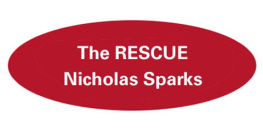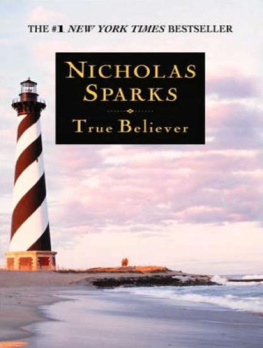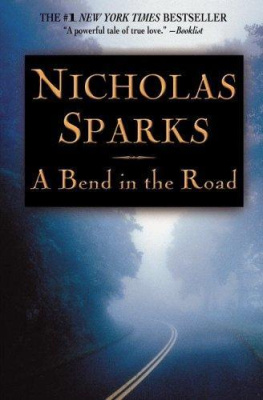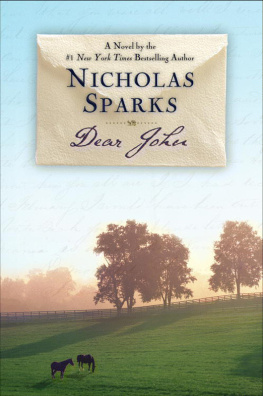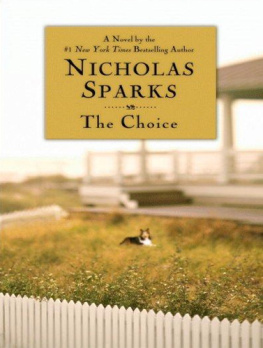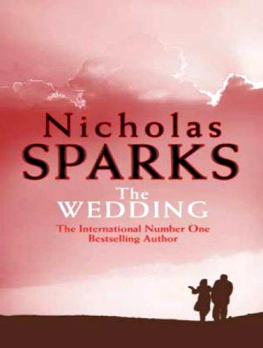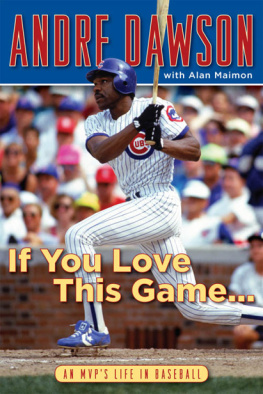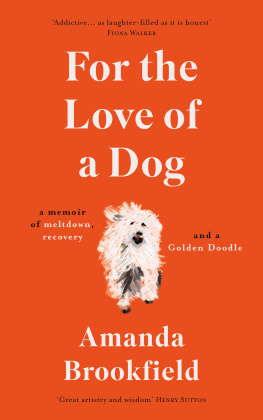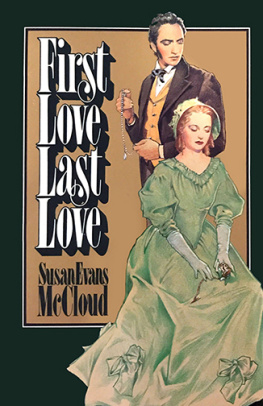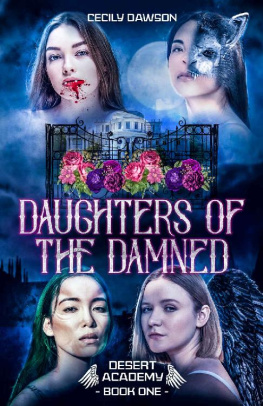

For Scott Schwimer
A wonderful friend
S ome novels are more challenging to write than others, and The Best of Me falls into that category. The Best of Me was difficult to writeI wont bore you with those reasonsand without the support of the following people, Id probably still be working on it. So, without further ado, I want to offer my thanks.
For Cathy, my wife: When we first met, it was love At First Sight, and nothing has changed in all the years weve been together. Youre the best, and I always consider myself lucky to call you my wife.
For Miles, Ryan, Landon, Lexie, and Savannah: You add joy to my life and Im proud of all of you. As my children, you are, and always will be, The Best of Me.
For Theresa Park, my agent: After finishing the first draft of the novel, I came to A Bend in the Road, and you deserve my gratitude not only for your efforts to help me improve the novel, but for your patience as I tried to work through it. Im fortunate to have you as an agent. Thank you.
For Jamie Raab, my editor: The Rescue you performed on this novel was, as always, amazing, and your suggestions spot-on. Youre not only a fabulous editor, but a wonderful person. Thank you.
For Howie Sanders and Keya Khayatian, my film agents: Im a True Believer when it comes to the idea that honor, intelligence, and passion are the bedrock of any good working relationship. Both of you exemplify these attributesalwaysand Im thankful for everything youve done. Im fortunate to work with you.
For Denise DiNovi: The producer of Message in a Bottleand other film adaptations of mine, of courseyouve become more than just someone with whom I work. Youve become my friend, and my life is better for it. Thank you so much, for everything.
For Marty Bowen: You did a wonderful job as the producer of Dear John, and I appreciate not only your efforts on my behalf, but your friendship as well. Thank you for all youve done and Im glad that were working together again.
For David Young, CEO of Hachette Book Group: Without question, youve made me The Lucky One, and I appreciate all you do. Thank you.
For Abby Koons and Emily Sweet, at Park Literary Group: My sincerest thanks for all the work you do on my behalf. Both of you go above and beyond when it comes to helping me out, and Im more appreciative than you know. Oh, and Emily? Congratulations on The Wedding
For Jennifer Romanello, my publicist at GCP: The Guardian of my tour Grazie for everything, as always. Youre the best.
For Stephanie Yeager, my assistant: After working on the set of Nights in Rodanthe, youve been keeping my life running smoothly ever since. I appreciate itand thank youfor all you do.
For Courtenay Valenti and Greg Silverman, at Warner Bros.: Thanks for taking a chance on me, and this novel, without reading it beforehand. It wasnt an easy decision, but Im appreciative of The Choice you made. Above all, Im thrilled to work with both of you again.
For Ryan Kavanaugh and Tucker Tooley, at Relativity Media, and Wyck Godfrey: Im incredibly excited about the film adaptation of Safe Haven, and Id like to thank all of you for giving me the opportunity to work with you again. Its an honor, and I wont forget it and I know youll do a wonderful job.
For Adam Shankman and Jennifer Gibgot: Thank you for the great work you did on the film version of The Last Song. I trusted you, and you came through something Ill never forget.
For Lynn Harris and Mark Johnson: Working with both of you, so long ago, was one of the best decisions of my career. I know youve both done many, many films since then, but just so you know, I will always, always be thankful for the film version of The Notebook.
For Lorenzo DiBonaventura: Thank you for the adaptation of A Walk to Remember. The passage of time does nothing to diminish my love for that movie.
For David Park, Sharon Krassney, Flag, and everyone else at Grand Central Publishing and United Talent Agency: While I once spent Three Weeks with My Brother, its been fifteen years that Ive been associated with all of you. Thanks for everything!

F or Dawson Cole, the hallucinations began after the explosion on the platform, on the day he should have died.
In the fourteen years hed worked on oil rigs, he thought hed seen it all. In 1997, hed watched as a helicopter lost control as it was about to land. It crashed onto the deck, erupting in a blistering fireball, and hed received second-degree burns on his back as hed attempted a rescue. Thirteen people, most of them in the helicopter at the time, had died. Four years later, after a crane on the platform collapsed, a piece of flying metal debris the size of a basketball nearly took his head off. In 2004, he was one of the few workers remaining on the rig when Hurricane Ivan slammed into it, with winds gusting over a hundred miles an hour and waves large enough to make him wonder whether to grab a parachute in case the rig collapsed. But there were other dangers as well. People slipped, parts snapped, and cuts and bruises were a way of life among the crew. Dawson had seen more broken bones than he could count, two plagues of food poisoning that sickened the entire crew, and two years ago, in 2007, hed watched a supply ship start to sink as it pulled away from the rig, only to be rescued at the last minute by a nearby coast guard cutter.
But the explosion was something different. Because there was no oil leakin this instance, the safety mechanisms and their backups prevented a major spillthe story barely made the national news and was largely forgotten within a few days. But for those who were there, including him, it was the stuff of nightmares. Up until that point, the morning had been routine. Hed been monitoring the pumping stations when one of the oil storage tanks suddenly exploded. Before he could even process what had happened, the impact from the explosion sent him crashing into a neighboring shed. After that, fire was everywhere. The entire platform, crusted with grease and oil, quickly became an inferno that engulfed the whole facility. Two more large explosions rocked the rig even more violently. Dawson remembered dragging a few bodies farther from the fire, but a fourth explosion, bigger than the others, launched him into the air a second time. He had a vague memory of falling toward the water, a fall that for all intents and purposes should have killed him. The next thing he knew, he was floating in the Gulf of Mexico, roughly ninety miles south of Vermilion Bay, Louisiana.
Like most of the others, he hadnt had time to don his survival suit or reach for a flotation device, but in between swells he saw a dark-haired man waving in the distance, as if signaling Dawson to swim toward him. Dawson struck out in that direction, fighting the ocean waves, exhausted and dizzy. His clothes and boots dragged him down, and as his arms and legs began to give out he knew he was going to die. He thought hed been getting close, though the swells made it impossible to know for sure. At that moment, he spotted a lone life preserver floating among some nearby debris. Using the last of his remaining strength, he latched on. Later, he learned that he was in the water for almost four hours and had drifted nearly a mile from the rig before being picked up by a supply ship that had rushed to the scene. He was pulled on board, carried belowdecks, and reunited with other survivors. Dawson was shivering from hypothermia, and he was dazed. Though his vision was blurredhe was later diagnosed with a moderate concussionhe recognized how lucky hed been. He saw men with vicious burns on their arms and shoulders, and others bleeding from their ears or nursing broken bones. He knew most of them by name. There were only so many places for people to go on the rigit was essentially a small village in the middle of the oceanand everyone made it to the cafeteria or the recreation room or gym sooner or later. One man, however, looked only vaguely familiar, a man who seemed to be staring at him from across the crowded room. Dark-haired and maybe forty years old, he was wearing a blue windbreaker that someone on the ship had probably lent him. Dawson thought he looked out of place, more like an office worker than a roughneck. The man waved, suddenly triggering memories of the figure hed spotted earlier in the waterit
Next page

